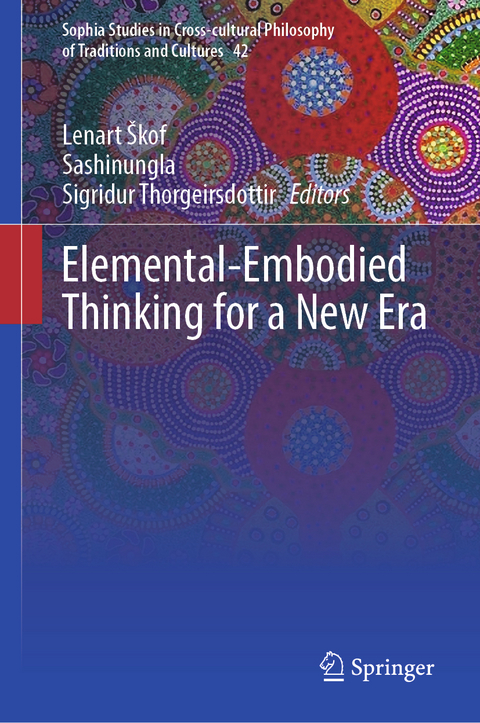
Elemental-Embodied Thinking for a New Era
Springer International Publishing (Verlag)
978-3-031-42118-1 (ISBN)
lt;b>Lenart Skof is among the leading international scholars in the field of respiratory-elemental thinking in philosophy. His main research interests lie in ethics, philosophical theology, comparative religion with intercultural philosophy, and feminist philosophy. His most recent books include Antigone's Sisters: On the Matrix of Love (SUNY Press, 2021), Atmospheres of Breathing, ed. by L. Skof and P. Berndtson (SUNY Press, 2018), Ethik des Atems (Freiburg: Herder/Karl Alber, 2017) and Breath of Proximity: Intersubjectivity, Ethics, and Peace (Springer, 2015).
Sashinungla is Professor of Philosophy at Jadavpur University, Kolkata, India. Her main research interests are ethics, feminist philosophy, environmental philosophy, and Indigenous philosophy. Books include Tradition and Modernity: Essays on Women of India, (co-ed), Suryodaya Books: 2015; Environment Preservation: A Philosophical Critique (Decent Books: 2005); and Ethics and Culture: Some Indian Reflections (co-ed.), Decent Books: 2010. She has published widely on feminist philosophy, insurgency, ethnic conflict, foreign policy, and tribal philosophy and culture with a particular focus on the Indian context. Current research projects focus on Indigenous philosophy, social and political ethics, and cosmocentric environmental thinking.
Sigridur Thorgeirsdottir is professor of philosophy at the University of Iceland and former Erkko professor at the Helsinki Collegium for Advanced Studies. She is an internationally known Nietzsche-scholar and a leading scholar in feminist philosophy with a special emphasis on philosophy of embodiment, nature and the environment. Among recent publications are Methodological Reflections on Women´s Contribution and Influence in the History of Philosophy (Springer 2020, ed. with R. Hagengruber), Nietzsche als Kritiker und Denker der Transformation (de Gruyter, 2016, ed. with H. Heit). Her recent research focuses on methodologies of embodied critical thinking. She is presently co-editing a Handbook on embodied critical thinking with contributions from authorities in the field.
Chapter 1.Aboriginal Indian Elemental Ontology.- Chapter 2.Closing the Subject-Object Rift Through Aboriginal Australian Elemental and Embodied Philosophy.- Chapter 3.Elements of Slovenian Indigenous Religion.- Chapter 4. The Glacier and Me - Understanding the Human Being as Embodied and Elemental.- Chapter 5.The Life in Black Lives Matter.- Chapter 6.The Gravity of Our Situation: On Acrophobia and Eco-Paralysis.- Chapter 7. Vegetal Environmental Pedagogy.- Chapter 8.Environmental Responsiveness in Conceptual Thinking.- Chapter 9.Elements of Embodied Critical Thinking.- Chapter 10.Methodologies of Embodied-Elemental Thinking in Ethics of Nature.
| Erscheinungsdatum | 26.11.2023 |
|---|---|
| Reihe/Serie | Sophia Studies in Cross-cultural Philosophy of Traditions and Cultures |
| Zusatzinfo | X, 194 p. 2 illus. |
| Verlagsort | Cham |
| Sprache | englisch |
| Maße | 155 x 235 mm |
| Themenwelt | Geisteswissenschaften ► Philosophie |
| Naturwissenschaften ► Biologie ► Ökologie / Naturschutz | |
| Schlagworte | atmospheres of breathing • Cognitive and Affective Paradigms in Environmental Thinking • Earth, Air, Fire, and Water as Environmental Ideas • Elemental Philosophy • Elemental Philosophy of Religion • Embodied Critical Thinking • Environmental Ethics • Environmental Humanities • environmental philosophy • Environmental Philosophy and Ethics in Buddhism • First Nations Indigenous Ontology • Paradigm Shift and Environmental Philosophy • philosophy of nature • Rationality and Tribal Thought • Responses to Climate Change in Humanities • through vegetal being |
| ISBN-10 | 3-031-42118-3 / 3031421183 |
| ISBN-13 | 978-3-031-42118-1 / 9783031421181 |
| Zustand | Neuware |
| Haben Sie eine Frage zum Produkt? |
aus dem Bereich


